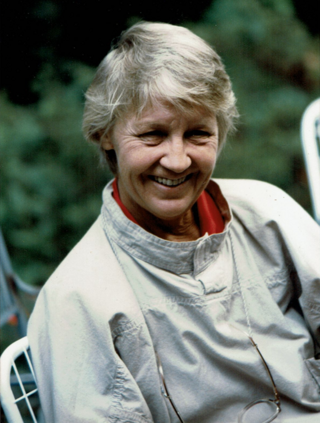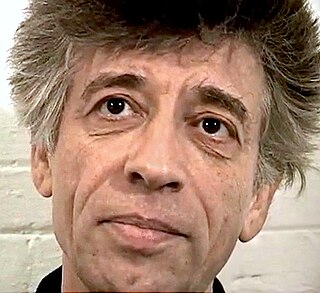
Alvin Augustus Lucier Jr. was an American experimental composer and sound artist. A long-time music professor at Wesleyan University in Middletown, Connecticut, Lucier was a member of the influential Sonic Arts Union, which also included Robert Ashley, David Behrman, and Gordon Mumma. Much of Lucier's work explores psychoacoustic phenomena and the physical properties of sound.

Pauline Oliveros was an American composer, accordionist and a central figure in the development of post-war experimental and electronic music.
William Duckworth was an American composer, author, educator, and Internet pioneer. He wrote more than 200 pieces of music and is credited with the composition of the first postminimal piece of music, The Time Curve Preludes (1977–78), for piano. Duckworth was a Professor of Music at Bucknell University. Together with Nora Farrell, his wife, he ran Monroe Street Music, the publisher of many Duckworth's pieces.
Process music is music that arises from a process. It may make that process audible to the listener, or the process may be concealed.
Joan Linda La Barbara is an American vocalist and composer known for her explorations of non-conventional or "extended" vocal techniques. Considered to be a vocal virtuoso in the field of contemporary music, she is credited with advancing a new vocabulary of vocal sounds including trills, whispers, cries, sighs, inhaled tones, and multiphonics.
Robert Nathan Sheff, known professionally as "Blue" Gene Tyranny, was an American avant-garde composer and pianist.
Elodie Lauten was a French-born American composer described as postminimalist or a microtonalist.
Lovely Music is an American record label devoted to new American music. Based in New York City, the label was founded in 1978 by Mimi Johnson, an outgrowth of her nonprofit production company Performing Artservices Inc. It is one of the most important and longest running labels focusing exclusively on new music and has released over 100 recordings on LP, CD, and videocassette.

Ruth Anderson was an American composer, orchestrator, teacher, and flutist.

Chris Mann was an Australian composer, poet and performer specializing in the emerging field of compositional linguistics, coined by Kenneth Gaburo and described by Mann as "the mechanism whereby you understand what I'm saying better than I do". He was, in the last 2 decades of his life, based in New York City.

Peter Zummo is an American composer and trombonist. He has been described as "an important exponent of the American contemporary classical tradition." He has called his own work "minimalism plus a whole lot more."
Ann Southam, was a Canadian electronic and classical music composer and music teacher. She is known for her minimalist, iterative, and lyrical style, for her long-term collaborations with dance choreographers and performers, for her large body of work, and, according to the Globe and Mail, for "blazing a trail for women composers in a notoriously sexist field".
Noah Creshevsky was a composer and electronic musician born in Rochester, New York. He used the term hyperrealism to describe his work.
NewMusicBox is an e-zine launched by the American Music Center on May 1, 1999. The magazine includes interviews and articles concerning American contemporary music, composers, improvisers, and musicians.
Jennifer Hymer is an American pianist, currently living in Hamburg, Germany.
Sorrel Hays was an American pianist, composer, filmmaker and artist.

Piano burning is the act of setting on fire an acoustic piano, most commonly an upright, as either a ceremony or a form of performance art. Although piano burning ceremonies are now popular in the Royal Air Force, Royal Canadian Air Force and the United States Air Force, there is little or no evidence to suggest that descriptions of its origin have any historical authenticity. According to one version of its origin, pianos were set alight by RAF pilots to avoid piano lessons aimed at improving their dexterity and general level of culture.
Jonathan Elliott is an American composer and teacher. Born in 1962, Elliott grew up in Bucks County, Pennsylvania, studying piano from the age of six. He went on to study composition at Vassar College, where his teachers included Annea Lockwood and the pianist Todd Crow; Elliott subsequently received his PhD from the University of Chicago, where he studied with Ralph Shapey and Shulamit Ran. He received two Broadcast Music, Inc. Student Composer awards in 1985 and 1987.
Kelly Moran is an American composer, producer, and multi-instrumentalist based in Brooklyn. Her music spans classical, electronic, minimalist, jazz, impressionist, and metal genres. In many of her compositions, Moran utilizes electronic musical techniques in combination with the John Cage-pioneered technique of the prepared piano. Moran signed with Warp Records in September 2018.
Alexandra Gardner is an American contemporary composer based in Baltimore, Maryland. Her music employs diverse acoustic instrumentation and electronics, drawing on minimalist and modernist influences as well as extra-musical sources and sounds. Critics note her work for its blend of contemplative and expressive qualities, clear structure and unexpected evolution, and complex rhythms. In a 2007 New Yorker essay, music critic Alex Ross placed Gardner among a "vital group of composers" creating a "new kind of interstitial music" that blurs genre boundaries.






